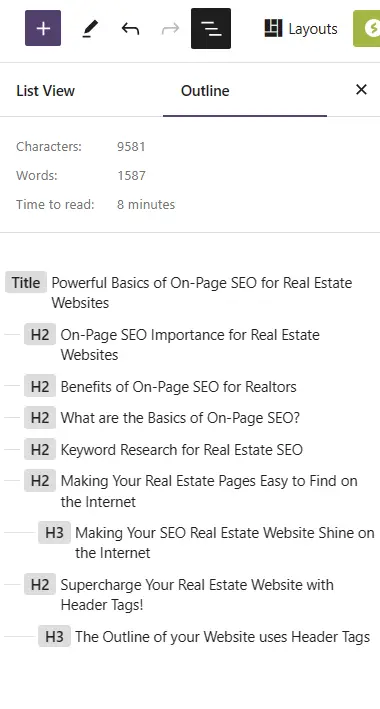Table of Contents[Hide][Show]
- On-Page SEO Importance for Real Estate Websites
- Benefits of On-Page SEO for Realtors
- What are the Basics of On-Page SEO?
- Keyword Research for Real Estate SEO
Supercharge Your Real Estate Website with Header Tags!+−
- The Outline of your Website uses Header Tags
- Frequently Asked Questions
- What are header tags in SEO?
- How do header tags affect SEO performance?
- What is the significance of using header tags in real estate websites?
- Can multiple header tags be used on a single webpage?
- Should header tags be used solely for SEO purposes?
- How frequently should header tags be used within a webpage?
Optimize your real estate website with expert On-Page SEO strategies for realtors. Boost visibility, drive traffic, and outrank competitors effectively.
On-Page SEO Importance for Real Estate Websites
The role of on-page SEO, and search engine optimization, is very critical to the success of real estate websites.
The majority of homebuyers and sellers are now turning to the internet to research and find properties; thus, real estate websites must be easily discoverable and accessible.
By optimizing these elements, real estate agents and brokers have an opportunity to improve their visibility in search engine results pages and attract more organic traffic.
Various factors such as keyword research, meta tags and descriptions, URL structure, and content organization form part of On-Page SEO that can enhance the general user experience as well as increase the chances of capturing leads.
Benefits of On-Page SEO for Realtors
Implementing effective real estate SEO techniques for websites provides a competitive edge, allowing you to outperform rivals and establish a strong online presence.
By having a grasp of on page optimization fundamentals and effectively employing strategies real estate professionals can gain an edge in their markets.
An optimized real estate website, with keywords and organized content, has a higher likelihood of appearing at the top of search engine rankings.
That improves your chances for potential clients to discover and interact with the website.
I like to optimize tags and descriptions to enhance click-through rates by providing concise yet enticing snippets that encourage users to click on the website link.
- That’s why I recommend that my clients and friends use the WordPress Plugin, Rank Math Pro. It has a built in SEO tool that is amazing and grades your content for readers and search engines. The higher the grade, on a scale of 1 to 100, the better.
- I use the Pro edition of Rank Math. It costs $79.00 for one website. Test it out for free.
What are the Basics of On-Page SEO?
When you’re fine-tuning your real estate website for search engines, think of on-page SEO as your secret weapon. Understanding the basics isn’t just a good idea – it can be a game-changer.
For realtors, it’s about showing up online, catching eyes, and drawing in those potential clients you’ve been dreaming of.
On-page SEO refers to the optimization techniques that are implemented directly on the website itself, improving its overall structure, content, and coding to make it more accessible to search engines.
- Be the master of keyword research so you can dominate that keyword phrase over the competition like Zillow, RedFin, Realtor.com, or your local agents.
- That is why I like the RankIQ tool to help me dominate the search engines when I’m writing blog posts and pages of content.
Conducting thorough keyword research allows real estate websites to identify the most relevant and high-performing keywords and phrases that their target audience is searching for.
By strategically incorporating these keywords into their website content, meta tags, and descriptions, real estate websites can increase their chances of ranking higher on search engine results pages (SERPs).
- Doing real estate SEO helps you to stand out in the crowd online. It is just like handing out flyers in a neighborhood. You want the homeowner to call you over your competition.
- The key is to learn SEO for real estate agents online.
SERPs stands for “Search Engine Results Pages.” It refers to the pages displayed by search engines in response to your search.
When we talk about SEO, the main aim is to boost your website’s position on search engine results. Why? Well, the higher it ranks, the better chance you have of catching the attention of people searching online.
Keyword Research for Real Estate SEO
When it comes to conducting keyword research for real estate websites, it’s important to know who your target audience is… first-time buyers, luxury buyers or sellers, or…
Are you focused on selling ranches, land, ocean-view homes, etc? Whatever your target market is that makes you unique, that is where you want to be the go-to real estate agent.

Keyword research is the process of identifying the words and phrases that potential customers are likely to use when searching for real estate information or properties online.
- 1. To begin keyword research, start by brainstorming a list of keywords that are relevant to your real estate website.
- Consider the location, property types, and services you offer, as well as any niche or specialized areas you focus on.
- Then, utilize keyword research tools such as Google Keyword Planner (free), SEMrush.com (paid), or SpyFu.com (paid or free) to identify the search volume and competition level for each keyword.
- Look for keywords with high search volume and relatively low competition, as these are more likely to drive targeted traffic to your website.
- I like long-tail keywords, which are more specific phrases that can often lead to higher conversion rates.
• Understand the needs and preferences of your target audience
• Identify relevant keywords related to location, property types, and services offered
• Utilize keyword research tools like Google Keyword Planner, RankIQ, or SpyFu.com
• Look for keywords with high search volume and low competition
• Consider long-tail keywords for higher conversion rates
• Optimize website content to rank higher in search engine results
Making Your Real Estate Pages Easy to Find on the Internet
Did you know there’s a way to help people find real estate pages easily on the internet? It’s like giving directions to your favorite place!
Imagine your favorite website as a treasure, and meta tags and descriptions are like hints for finding it. This information tells search engines what the page is about, so when people look for something specific, they can find it more easily.
To make these hints work better, we use keywords – important words that match what people are searching for.
In the title tag, we put the main keyword, like the title of a book. This title shows up in search results and should make people want to click on it.
The meta description is like the back cover of the book; it gives a short summary to help people decide if they want to visit the page.
So, when we optimize (make better) these hints for real estate pages, we’re making sure they’re short, clear, and match what people are looking for. That way, more people can discover these pages and find what they need!”
Making Web Addresses Easy to Find on the Internet
Have you ever wondered how to make internet addresses better so people can find cool houses more easily? It’s a bit like creating a treasure map!
When we talk about making SEO-friendly URLs, we mean making the web address clear and short. It’s like giving a name to a house so that everyone knows what’s inside. Instead of a boring address like “www.realestate.com/listing1234,” we can use words to describe the house, like “https://www.redwagonteam.com/southern-california-homes-with-boat-docks/“
It’s also important to keep the address tidy.
That means avoiding weird symbols or long words.
A clean and short address not only helps computers understand what’s on the page but also makes it easy for people to remember and share.
So, by making these simple changes, we make sure that when someone is looking for a house, they can find it easily on the internet. It’s like creating a special sign that says, ‘Cool House Here!’
Making Your SEO Real Estate Website Shine on the Internet
When it comes to your real estate website, making it easy for both people and search engines is key. Think of it like arranging a great party – you want everyone to have a good time!
- One smart trick is breaking down your website content into clear sections with catchy titles and bullet points. This helps visitors easily find what they’re looking for, like finding different rooms at a party.
Now, you don’t want your party to be all pictures and no talking. Just like that, balance is crucial.

- Cool pictures and videos make your site fun, but you also need words for search engines to understand. Throw in some important words in titles and headings – it’s like making sure everyone knows what the main attractions are.
Oh, and don’t forget to organize things neatly! Imagine giving your guests a map to help them explore. That’s what categories and links do for your website – they guide search engines so they can show off all the cool stuff you’ve got!
Supercharge Your Real Estate Website with Header Tags!
Ever heard of header tags?
They’re like the superheroes of making your real estate website awesome on the internet! Imagine them as titles and subtitles in a book – they help organize the story and make it easier to understand.
The Outline of your Website uses Header Tags
H1 – title
H2 – subtitle
H3 – subtitle

So, these tags (H1, H2, H3, etc.) are like the table of contents for your webpage. They tell search engines what each part is about, just like chapter titles in a book. Using them the right way makes your website much more visible and cooler.
The main superhero, H1, shouts out the main idea of your page.
It’s like saying, ‘Hey, this is what we’re talking about!’ It’s important to use words that really describe your page.
And when you use other header tags, like H2 and H3, it’s like adding more details to the story.
When your website uses these header tags, it’s like giving a map to search engines, helping them understand your site better.
This means more people can find your awesome real estate content when they’re searching online!
Frequently Asked Questions
-
What are header tags in SEO?
Header tags are HTML elements used to define the headings or subheadings on a webpage. They range from H1 to H6, with H1 being the main heading and H6 being the smallest subheading.
-
How do header tags affect SEO performance?
Header tags play a crucial role in SEO as search engines use them to understand the structure and hierarchy of a webpage. Proper utilization of header tags can improve the visibility and ranking of your website in search engine results.
-
What is the significance of using header tags in real estate websites?
You need every edge you can find online. Organize your content with Header Tags, add photos, numbered lists, and more. You are in the marketing business.
-
Can multiple header tags be used on a single webpage?
Yes, multiple header tags can be used on a single webpage. However, it is important to maintain the proper hierarchy and structure of the content by using H2, H3, and so on, in a logical manner.
-
Should header tags be used solely for SEO purposes?
Nope! Header tags aren’t just for impressing search engines; they’re like the organizers of a party for everyone, including our human visitors. They help keep things neat so everyone can enjoy the content easily.
-
How frequently should header tags be used within a webpage?
There is no strict rule regarding the frequency of header tag usage within a webpage. It should depend on the length and structure of the content. Header tags should be used when they help organize the content and provide a logical flow to both search engines and users.



 Boost Conversions by Adding IDX to Your WordPress Real Estate Themes
Boost Conversions by Adding IDX to Your WordPress Real Estate Themes


